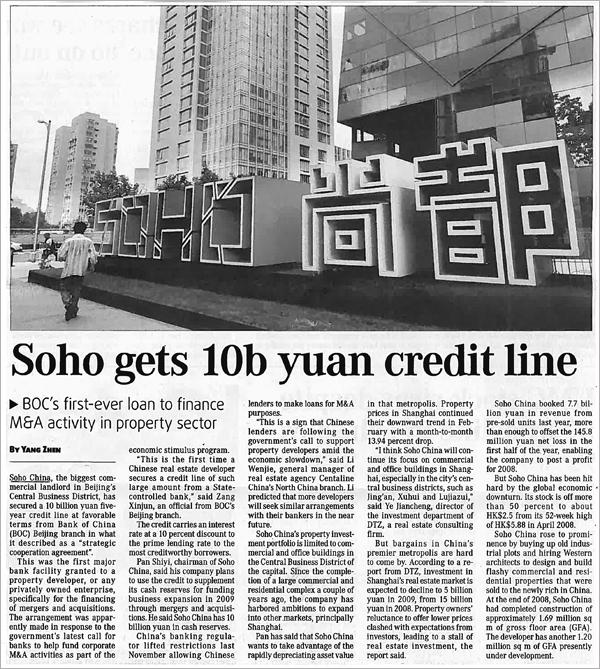
By Yang Zhen
Soho China, the biggest commercial landlord in Beijing s Central Business District, has secured a 10 billion yuan five-year credit line at favorable terms from Bank of China (BOC) Beijing branch in what it described as a strategic cooperation agreement .
This was the first major bank facility granted to a property developer, or any privately owned enterprise, specifically for the financing of mergers and acquisitions. The arrangement was apparently made in response to the government s latest call for banks to help fund corporate M&A activities as part of the economic stimulus program.
This is the first time a Chinese real estate developer secures a credit line of such large amount from a State-controlled bank, said Zang Xinjun, an official from BOC s Beijing branch.
The credit carries an interest rate at a 10 percent discount to the prime lending rate to the most creditworthy borrowers.Pan Shiyi, chairman of Soho China, said his company plans to use the credit to supplement its cash reserves for funding business expansion in 2009 through mergers and acquisitions. He said Soho China has 10 billion yuan in cash reserves.
China s banking regulator lifted restrictions last November allowing Chinese lenders to make loans for M&A purposes.
This is a sign that Chinese lenders are following the government s call to support property developers amid the economic slowdown, said Li Wenjie, general manager of real estate agency Centaline China s North China branch. Li predicted that more developers will seek similar arrangements with their bankers in the near future.
Soho China s property investment portfolio is limited to commercial and office buildings in the Central Business District of the capital. Since the completion of a large commercial and residential complex a couple of years ago, the company has harbored ambitions to expand into other markets, principally Shanghai.
Pan has said that Soho China wants to take advantage of the rapidly depreciating asset value in that metropolis. Property prices in Shanghai continued their downward trend in February with a month-to-month 13.94 percent drop.
I think Soho China will continue its focus on commercial and office buildings in Shanghai, especially in the city s central business districts, such as Jing an, Xuhui and Lujiazui, said Ye Jiancheng, director of the investment department of DTZ, a real estate consulting firm.
But bargains in China s premier metropolis are hard to come by. According to a report from DTZ, investment in Shanghai s real estate market is expected to decline to 5 billion yuan in 2009, from 15 billion yuan in 2008. Property owners reluctance to offer lower prices clashed with expectations from investors, leading to a stall of real estate investment, the report said.
Soho China booked 7.7 billion yuan in revenue from pre-sold units last year, more than enough to offset the 145.8 million yuan net loss in the first half of the year, enabling the company to post a profit for 2008.
But Soho China has been hit hard by the global economic downturn. Its stock is off more than 50 percent to about HK$2.5 from its 52-week high of HK$5.88 in April 2008.
Soho China rose to prominence by buying up old industrial plots and hiring Western architects to design and build flashy commercial and residential properties that were sold to the newly rich in China. At the end of 2008, Soho China had completed construction of approximately 1.69 million sq m of gross floor area (GFA). The developer has another 1.20 million sq m of GFA presently under development.





